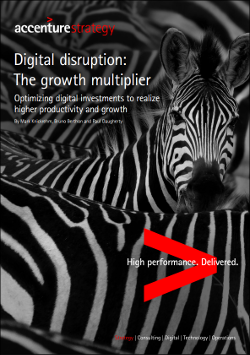Ungated Post | 20 Jan 2016
Digital disruption: The growth multiplier

Accenture Research and Oxford Economics have estimated that the digital economy, involving some form of digital skills and digital capital, represents 22.5 percent of global GDP. However digital’s ability to unlock value is far from being fully exploited. Until now, it is the technology giants and born-digital companies that have taken advantage of digital disruption. But there is an opportunity for traditional incumbents to more aggressively pursue new digital business models. By optimizing their digital investments, business leaders and policy makers can be more competitive, productive and bring quality of life to people. Understanding where to make those investments to realize the greatest improvement in gross domestic product is the subject of recent analysis by Accenture Strategy and Oxford Economics.
We found that high-performing economies could realize better returns from the optimal combination of investments in digital skills, digital technologies and digital accelerators. Our modelling shows how the smarter use of digital could boost productivity and generate US$2 trillion of additional economic output by 2020. In this way, digital investments can act as a growth multiplier in the coming years. Take the United States where optimised in investments in digital skills, digital technologies and digital accelerators in line with our calculations could see the nation increase its GDP by 2.1 percent—which equates to US$421 billion in 2020. Business leaders and policy makers need to invest the right amounts in the right areas; by doing so, they can discover new profitable, scalable and sustainable ways to help their economies grow.
Click here to read the full report.
Oxford Economics’ team is expert at applying advanced economic tools that provide valuable insights into today’s most pressing business, financial, and policy issues.
To find out more about our capabilities, contact:
Americas
Diantha Redd
+1 (646) 503 3052
Email
Asia Pacific
Peter Suomi
+65 6850 0110
Email
EMEA
Aoife Pearson
+44 (0)203 910 8054
Email
Related Services

Post
KPMG M&A Outlook 2026: Between Uncertainty, Resilience, and Seizing Opportunities
Discover how Germany’s M&A landscape is evolving – with a focus on growth, AI and post-merger value creation.
Find Out More
Post
Silver, the next generation metal
This report highlights the critical role silver plays in data centres and artificial intelligence (AI), automotive and electric vehicles (EVs), and solar energy photovoltaics (PVs). With these sectors expected to expand significantly over the coming years, we expect future silver demand to be strong.
Find Out More
Post
Powering the UK Data Boom: The Nuclear Solution to the UK’s Data Centre Energy Crunch
The UK’s data centre sector is expanding rapidly as digitalisation, cloud computing, and artificial intelligence (AI) drive surging demand for high-performance computing infrastructure.
Find Out More